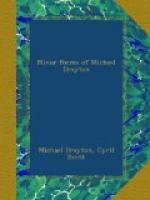Then whom the Sunne in all his way,
Nere saw two daintier Maids.
And through the thickets thrild his fires,
Supposing to haue seene
The soueraigne Goddesse of desires,
Or Ioves Emperious Queene:
Both of so wondrous beauties were,
In shape both so excell,
That to be paraleld elsewhere,
No iudging eye could tell. 20
And their affections so surpasse,
As well it might be deemd,
That th’ one of them the other was,
And but themselues they seem’d.
And whilst the Nimphes that neare this place,
Disposed were to play
At Barly-breake and Prison-base,
Doe passe the time away:
This peerlesse payre together set,
The other at their sport, 30
None neare their free discourse to let,
Each other thus they court,
Dorida.
My sweet, my soueraigne Rodope,
My deare delight, my loue,
That Locke of hayre thou sentst
to me,
I to this Bracelet woue;
Which brighter euery day doth
grow
The longer it is worne,
As its delicious fellowes
doe,
Thy Temples that adorne.
40
Rodope.
Nay had I thine my Dorida,
I would them so bestow,
As that the winde vpon my
way,
Might backward make them flow,
So should it in its greatst
excesse
Turne to becalmed ayre,
And quite forget all boistrousnesse
To play with euery hayre.
Dorida.
To me like thine had nature giuen,
A Brow, so Archt, so cleere,
50
A Front, wherein so much of
heauen
Doth to each eye appeare,
The world should see, I would
strike dead
The Milky Way that’s
now,
And say that Nectar Hebe
shed
Fell all vpon my Brow.
Rodope.
O had I eyes like Doridaes,
I would inchant the day
And make the Sunne to stand
at gaze,
Till he forget his way:
60
And cause his Sister Queene
of Streames,
When so I list by night;
By her much blushing at my
Beames
T’ eclipse her borrowed
light.
Dorida.
Had I a Cheeke like Rodopes,
In midst of which doth stand,
A Groue of Roses, such as
these,
In such a snowy land:
I would then make the Lilly
which we now
So much for whitenesse name,
70
As drooping downe the head
to bow,
And die for very shame.




